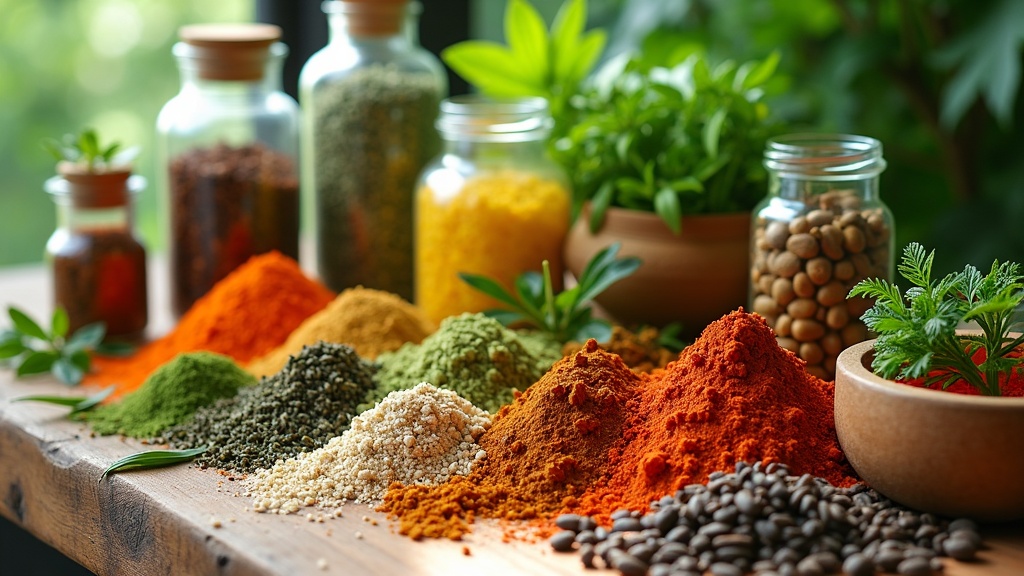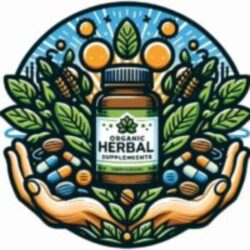Natural anti-inflammatories have caught people’s attention lately, especially with how much buzz there is around joint comfort, heart health, and giving the good old immune system some backup. You probably know that chronic inflammation can quietly mess with the body over the years, slowly leading to those everyday aches or develop into even bigger health concerns. Trying out what nature has to offer seems like a pretty cool idea and a straightforward place to start.

The Science Behind Natural Anti-Inflammatories
Inflammation is just the body’s way of fighting off what it thinks is harmful; it acts as an internal alarm system. But when it’s ALWAYS turned on (that’s called chronic inflammation), things are starting to go out of balance, not working quite as smoothly. It is just like an early warning light on your car’s dashboard. If neglected, however, over time, this can lead to issues like joint soreness, decreased energy, even a higher risk of heart problems, or your immune system getting out of sync.
So, how do natural anti-inflammatories help? Many plants and herbs have natural compounds that can help the body calm that constant inflammatory response. These aren’t “magic cures,” but they can be a solid part of an add-on strategy to support basic health care. Of course, it’s important to talk things through with a healthcare professional to find out what fits my needs.
Top Herbal and Natural Remedies for Inflammation and Overall Wellness
There are plenty of herbs and natural remedies out there, but a few have some pretty convincing research behind them when it comes to supporting joint, heart, and immune health. Here’s a closer look at some you will find well worth checking out:
- Turmeric (Curcuma longa): Turmeric is known for its starring player, curcumin. There’s a stack of evidence that curcumin plays a role in settling down various inflammation pathways. People use turmeric in teas, food, or as a supplement. You may find that adding black pepper (with piperine) helps boost how much curcumin the body absorbs (see studies).
- Ginger (Zingiber officinale): Ginger has been used forever in cooking and herbal medicine. The compounds called gingerols help ease inflammation and can support everything from joint comfort (especially if you’re active or dealing with stiffness) to digestion.
- Omega-3 Fatty Acids: Found mostly in fish oil, flaxseed, and chia seeds, omega-3s support the body’s way of balancing immune response. Multiple studies show they may help with joint discomfort and may also protect the heart (Harvard resource).
- Boswellia (Boswellia serrata): Every time I look into herbal options for inflammation, Boswellia pops up. It’s often used for joint support, especially in traditional Ayurvedic medicine.
- Green Tea (Camellia sinensis): Green tea gets attention for its polyphenols, mainly EGCG. It’s helpful for post-workout aches and might help the immune system stay in top shape.
- Resveratrol: While red wine is famous for this compound, I skip the booze and reach for grapes or blueberries instead. Resveratrol is being studied for how it may support heart health by reducing certain inflammatory markers.
- Quercetin: This one’s a flavonoid found in apples, onions, and berries. It’s linked to supporting balanced immune reactions and soothing inflammation in the body.
Other remedies, like white willow bark or bromelain from pineapple, are also popular. Although this article focuses on the most studied options, you can check these out as well, especially if you want to mix in some variety to your routine. Always remember, though, that sometimes the right combination of herbs and lifestyle habits add up to the best results.
It may take a bit of time, dedication, and patience for you to find the optimum natural combinations for your body. The results will be well worth it.
How to Choose Herbs and Natural Remedies for Inflammation
Picking the right herb can feel like choosing a path when you don’t know where it leads. Start by figuring out what your priorities are: is it joint comfort, cardio health, or immune function? Look for brands that third-party test their supplements. LiveGood is competitively priced, top quality, and has an excellent range, which you may want to check out here: https://www.shoplivegood.com/products
Checking labels for certifications and reading reviews also helps. Before adding anything new, a quick check with your healthcare provider can save you from possible interactions or wasting money on things that may not be a good fit for you.
Cost and quality matter too. Sometimes the cheapest supplement sits on the shelf because it’s packed with fillers or doesn’t have enough of the active ingredient. Trustworthy brands are up front about sourcing and quality testing, so stick with reputable brands whenever possible. A money-back guarantee is a big bonus!
Should You Take Supplemental Herbs for Inflammation?
Supplemental herbs can be handy, especially if it is a challenge to get the nourishment your body needs from food alone. Some people get good results from switching up their diet, like tossing turmeric into curries or ginger into smoothies, while others prefer a capsule for the sake of convenience. Always go for whole foods first, but sometimes life calls for shortcuts. Still, more isn’t always better, so stick to the recommended dosages and check for any side effects or medication interactions
It’s worth mentioning that supplements sometimes work best together. For example, pairing turmeric with black pepper makes curcumin much more available, and fish oil works well in meals that already contain a good balance of healthy fats. That means paying attention to your overall diet and not just relying on one herb or supplement to do all the heavy lifting.
Can Natural Remedies Help Tackle Chronic Inflammation?
Natural remedies can play a solid supportive role, especially for mild to moderate inflammation, but they’re not a substitute for professional care. Some have seen friends and family add herbs like green tea and turmeric and experience great results: more comfort or mitigation of discomfort during day-to-day activities.
The key is patience, as herbal remedies tend to work best when used daily and consistently, not as quick fixes.
Chronic inflammation usually ties back to bigger lifestyle things, like stress, a poor diet, or not moving or being active enough. Natural remedies are most helpful when teamed up with other healthy habits: eating well, sleeping enough, managing stress, and keeping active. Adding a fish oil supplement or using ginger in tea feels easy to keep up when wrapped into a routine. Sometimes, just being mindful of what to eat or being active works wonders alongside natural anti-inflammatories.
Botanical Medicines and How They Support Inflammation
Botanical medicines work by using plant chemicals, or phytonutrients, that interact with the body’s natural processes. For example, curcumin in turmeric can help lower the production of certain molecules that ramp up inflammation. Boswellia has been shown to block enzymes that break down cartilage in the joints. Polyphenols, the plant-based compounds in things like green tea and berries, also seem to encourage the immune system not to overreact.
These botanicals aren’t a one-size-fits-all option. What works for joint soreness might not be useful for heart or immune support, and vice versa. Testing a new supplement or tea for a few weeks will help you notice any subtle positive changes or confirm whether to try something else. Sometimes, adjusting the dose or switching up the type of herbal remedy provides better, more noticeable relief, but the only way to find out is to give each a fair trial. Always be patient.
Kanna and Other Notable Herbs
Kanna (Sceletium tortuosum) is a plant you may stumble upon pretty often in conversations about mood and stress, as well as inflammation. It’s mainly known for supporting mental well-being, rather than being a go-to for joint pain or reducing chronic inflammation. There’s early research suggesting kanna might calm the mind and ease nervous tension, which can help if stress is aggravating inflammation in your life. If that’s the case, kanna could be worth looking at, but for straight-up inflammation, turmeric, ginger, or omega-3s will probably play a bigger role.
There are plenty of other herbal contenders too, like willow bark or bromelain from pineapple, but stick with remedies that have a long track record and solid research. Trying new options in moderation and observing how the body responds helps tailor your approach for the best effects over the long haul.
Herbal Medicine’s Role in Anxiety and Overall Wellness
The link between inflammation and anxiety is popping up in more research lately. Some herbal remedies like kava, passionflower, ashwagandha, and yes, kanna, are used for stress and mood, while also having gentle anti-inflammatory properties. Managing anxiety can help keep your body’s stress response, and by extension, inflammation, steadier.
However, keep expectations realistic. Herbs might take the edge off, but they’re not a replacement for therapy or expert care. Still, they’re often super helpful as “addons” in a well-rounded routine. The body recognizes and assimilates natural ingredients more completely. For example, sipping chamomile tea or taking ashwagandha can offer a calm moment that works alongside other healthy habits. Meditation, mindful breathing, and keeping up social support can also take recovery and comfort up a notch when dealing with anxiety and inflammatory stress.
Everyday Steps for Getting the Most from Natural Remedies
- Add herbs to meals: Mixing ginger and turmeric into your food intake doesn’t just taste good; it’s an easy way to build up benefits over time.
- Stick to a daily routine: Consistency is a requirement if you are after the best changes. A daily turmeric capsule or omega-3 supplement becomes another easy habit.
- Keep expectations in check: Natural remedies are a piece of the overall puzzle, not the only answer. That’s why staying patient should be a companion to consistency, and make sure to care for other basics: sleep, movement, stress management, and regular checkups.
Other practical steps include making a written plan- so remember to incorporate herbs into meals, tracking side effects or changes in a journal, and connecting with online communities to swap ideas and get feedback. There’s a lot to gain from sharing stories with others who use natural remedies for inflammation, because personal experience can offer insight beyond what the research says.
Frequently Asked Questions
How do I find the best herbs for inflammation?
Careful research helps buyers make informed decisions. Choosing high-quality products, checking reviews, and consulting a healthcare provider will be a reliable guide to options that work for your needs.
Are supplements better than food sources?
Supplements offer convenience, but try food sources first since the body handles nutrients best from whole foods. Supplements come in handy if there’s a gap in your diet or if someone has higher needs than usual.
How long does it take for natural anti-inflammatories to work?
Most herbal options need some time, usually weeks, before their positive effects show up. Staying consistent is key. Remember to remain patient.
Is natural always safer?
Not all natural options are automatically safe. Allergies, interactions, or high doses can still cause problems. Getting advice from a qualified professional is super important before starting something new.
Final Thoughts and Precautions
I’ve found that adding natural anti-inflammatories into your daily routine can support joint comfort, help the heart, and give the immune system a bit of extra strength. Herbal remedies work best with a balanced lifestyle, not instead of one. Before adding new herbs or supplements, especially if you have ongoing health conditions, are pregnant, or take medication, it’s really important to chat with a professional for guidance tailored specifically to you.
